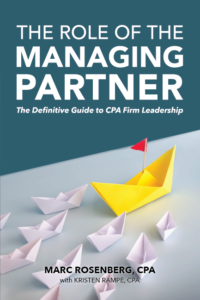How Partner Meetings Waste Time (and How to Avoid It)
![]() Kristen Rampe, CPA / Dec 20, 2023
Kristen Rampe, CPA / Dec 20, 2023
Well-intentioned and passionate partners have a lot to say about matters at your CPA firm. Often, these contributions are critical to leadership and strategic direction. Your firm wouldn’t be where it is today without hearing the perspectives from those who lead and run your practice.
And, sometimes, your partners get stuck on a less important matter that has them all riled up. We all have our hot buttons, and stepping back from them can be very difficult.
Here are a few real-life examples of less-than-critical partner meeting discussions:
- What kind of cookies should we have at the conference?
- Should the jury duty pay benefit be increased to one week?
- Are the colors in the new logo perfectly on-brand, or should that grape color be a little more plum?
- Should partners be on the dishwasher-emptying schedule as regularly as other team members?
I did not make those up, and the conversations weren’t quick. Opposing sides shared their thoughts, additional information was laid out, disagreements ensued. And often, in the end, no immediate resolution was reached because no one was steering the ship.
Going off on a low-value tangent is only one challenge with keeping partner meetings on track.
Ways partner meetings can be inefficient with partner time:
- Not having an agenda.
- Not having timeframes on the agenda.
- Not having a meeting leader who can effectively stick to the agenda (this is how you avoid debating chocolate chip vs oatmeal raisin).
- Not having a person or small group in charge of developing an effective agenda in advance or during the meeting (actively prioritizing the most important items).
- Having all partners spend time on topics that are relevant only to a smaller group.
Some of those may feel familiar to you, and you’re not the only one. If you’re ready to make changes to the efficiency of your partner meetings, you can take any number of steps:
- Define the purpose of the meeting. For real. Don’t just hold partner meetings because you think you should. Why are you meeting? What are you there to do? Are there decisions you need to make? Issues you need to think through? You may need multiple types of meetings; e.g. “in the business” and “on the business” or departmental and strategic.
- Develop an agenda. Your agenda should align with the purpose of the meeting. You may want to leave room for new topics to be added during the meeting (ideally at the beginning), or you may want to solicit those in advance.
- Determine the best meeting leader. It should be someone who has the positional or relational authority to keep partners on track with the agenda and timeframes. This person should know how to table new topics that come up for later discussion or a separate meeting. It does not have to be the Managing Partner.
- Start on time and end on time (or early) – unless your firm subscribes to a different way of operating, though we wouldn’t recommend it.
- Make decisions. This circles back to the agenda: Did you have decisions to make? Do you have sufficient information to make them? (Note: sufficient information, like reasonable assurance, is notably less than 100% of all possible information and highly dependent on issue-materiality.) At the right time, the meeting leader should direct the conversation to make a call or set a preliminary direction that can be executed after the meeting. Without decision-making, topics get revisited time after time. For many matters, this results in compounded waste of time.
Our book The Role of the Managing Partner includes: how the best MPs in the country impact their firm’s success • how the MP manages the other partners • getting partner accountability • increasing profitability • management vs. leadership • authority that the MP should have • 25 best practices that the MP should focus on • the MP’s role in managing staff and revenue growth • how MPs lead the charge in merging in other firms • why it’s critically important for the MP to assemble a great management team • partner compensation-a potent weapon in the MP’s arsenal • observations of how the very best MPs operate • essential organizational skills for MPs • evaluating the MP • why and how MPs fail • great quotes from great leaders.
As a firm grows, you will need to revisit your partner meeting cadence. In small firms, partners decide many things together. With six to eight partners or more, it may be time to delegate authority to smaller groups to make decisions on specific topics and budget areas. Of course, your decision-makers need to follow a solid process of gathering information and keeping the best interests of the firm in mind.
What happens after the meeting is just as important. This is when accountability for taking any actions determined in the meeting takes place. If your firm is challenged in this area, you may want to consider implementing a goal-setting program or routine follow-up by MP/Executive Committee members.
Partner meetings are a critical function of any well-run accounting firm. Opposing opinion must be heard to allow for well-rounded discussion. But if an agonizing amount of time is spent on low-consequence matters, firm efficiency and profitability are at stake. The ability to run meetings properly and make decisions deserves attention.
What has your partner group spent too much time debating? What techniques have you used to increase partner meeting effectiveness? We’d love to hear in the comments below.

The Role of the Managing Partner: The Definitive Guide to CPA Firm Leadership
The biggest factor in achieving organizational success is strong management and leadership. In CPA firms, this is the role of the Managing Partner. Want to know how the best MPs across the country are impacting their firms and how you can be a difference-maker and a better MP? Look no further than Marc Rosenberg’s latest…
Learn More